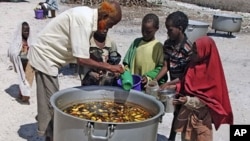International organizations are not the only ones giving aid to the many thousands of Somalis displaced by drought and conflict. Somalis groups are also involved. One is the NGO Hijra.
"Currently, we are responding to the crisis in Mogadishu, the drought affected people, who are actually coming on a daily basis to Mogadishu. We also are doing some response to the conflict affected people in Mogadishu. So now, we are actually reaching more than 300,000 people living in Afgooye Corridor, which is actually outside Mogadishu, and about another 40,000 staying inside Mogadishu,” said Mohamed Dahir, Hijra’s director.
Terrible
The displaced have walked for many days in search of something to eat. Some have had to leave family members, including children, along the roadside when they became too weak to walk.
Dahir said, “Their condition is very terrible and these people are malnourished. If you see now the condition of children and mothers in these IDP camps it’s very terrible. Most of them are coming into the camp malnourished, very weak and walked long distances from the areas where they used to live. Most of them are coming from the areas actually struck by drought – from Bay, from Bakool and Lower Shabelle region.”
Hijra provides clean water and sanitation. In Mogadishu, Its members have worked very close to the frontline between militants and forces loyal to the TFG, the Transitional Federal Government.
Dahir said the city remains risky, even though militants withdrew from the area earlier this month. One reason is a cholera and acute watery diarrhea outbreak affecting more than 1600 people. The NGO is helping administer oral rehydration salts and educate Somalis about the illnesses.
“We also are giving them some message through the radios, through the FM radios. And we have already used some vehicles, mounted a public address system whereby we can tell the risks and how they can actually prevent and minimize the risks of the current outbreak,” he said.
Our country
He said many Somalis are trying to save their country from conflict, drought and famine.
“We have no choice, actually, this is our country. These are our people dying every day because of the drought, because of the conflict, because of kind of an ignorance and all those things. So, we have no other option but to go back and actually work with our people, so that at least we save lives what we can.” He said.
Dahir says he wants the world to know that Somalis are very hardworking and dynamic people. He says no one suspected that 20 years after the fall of leader Mohamed Siad Barre the country would still be in conflict, while suffering from famine and drought.















